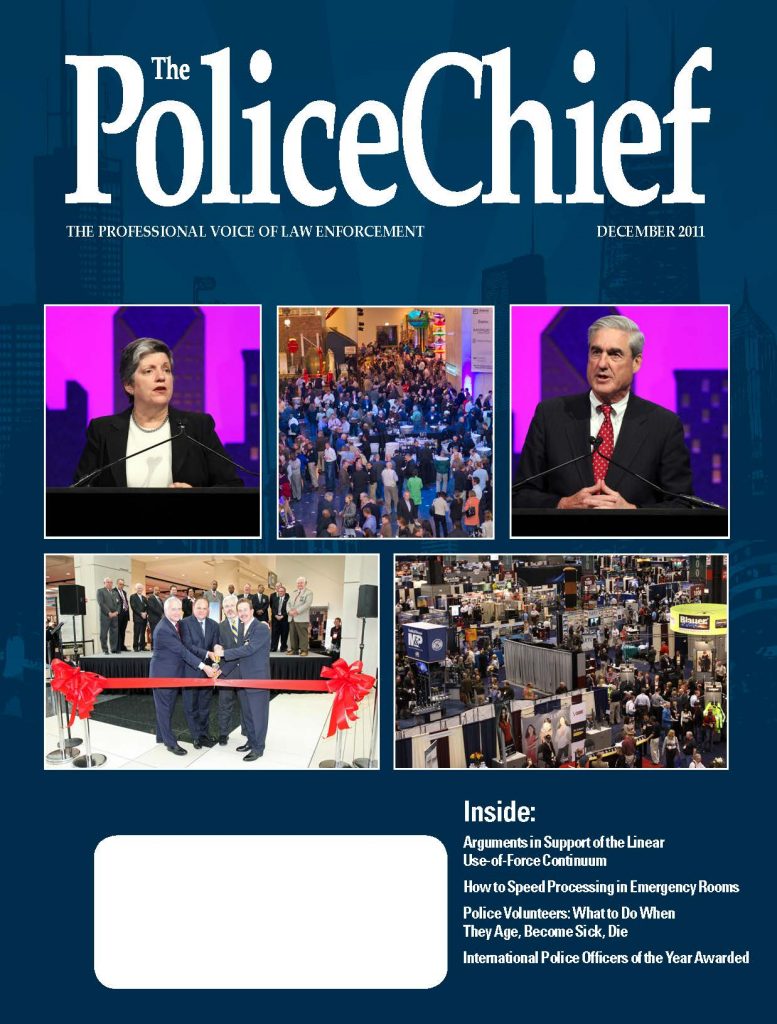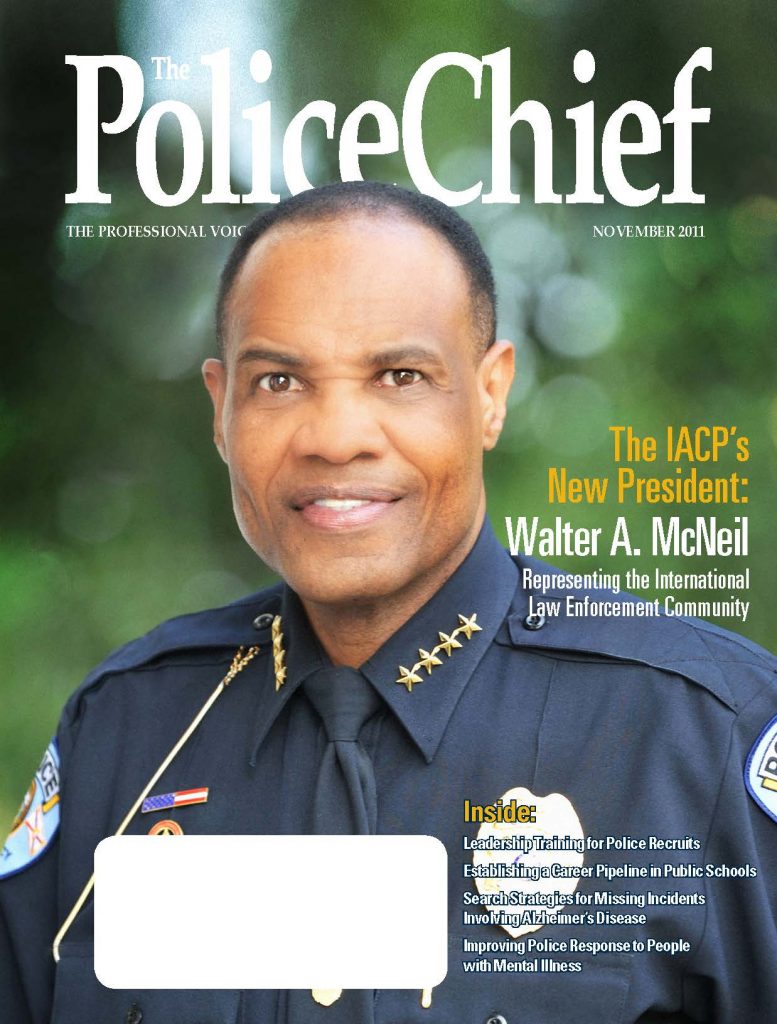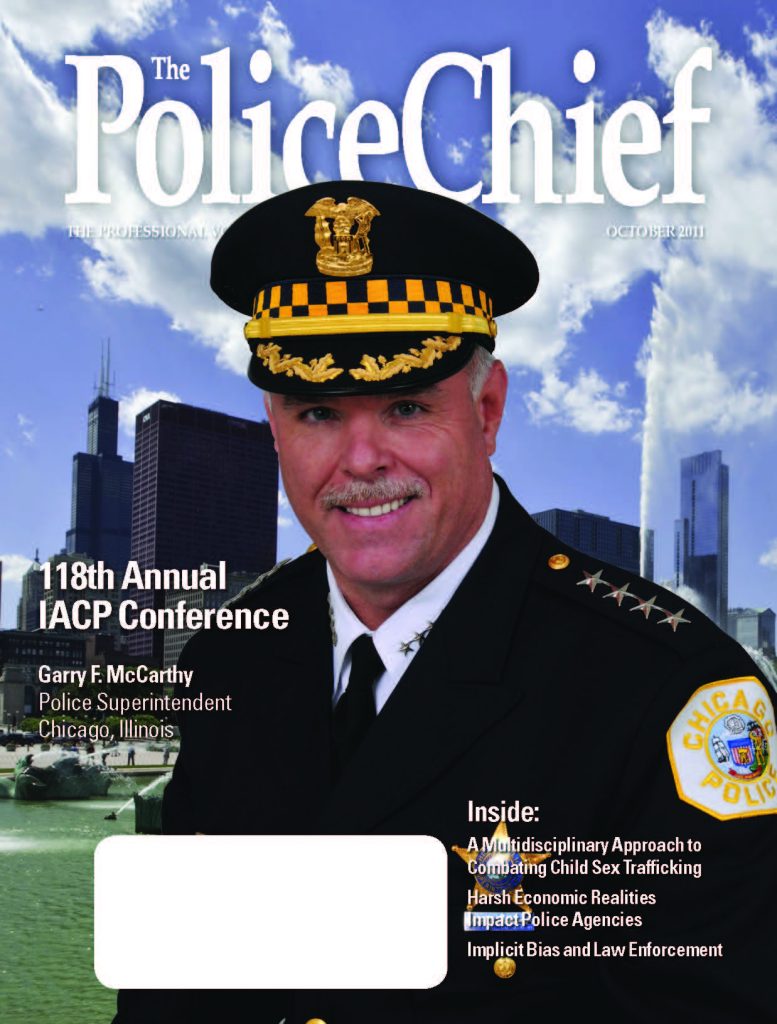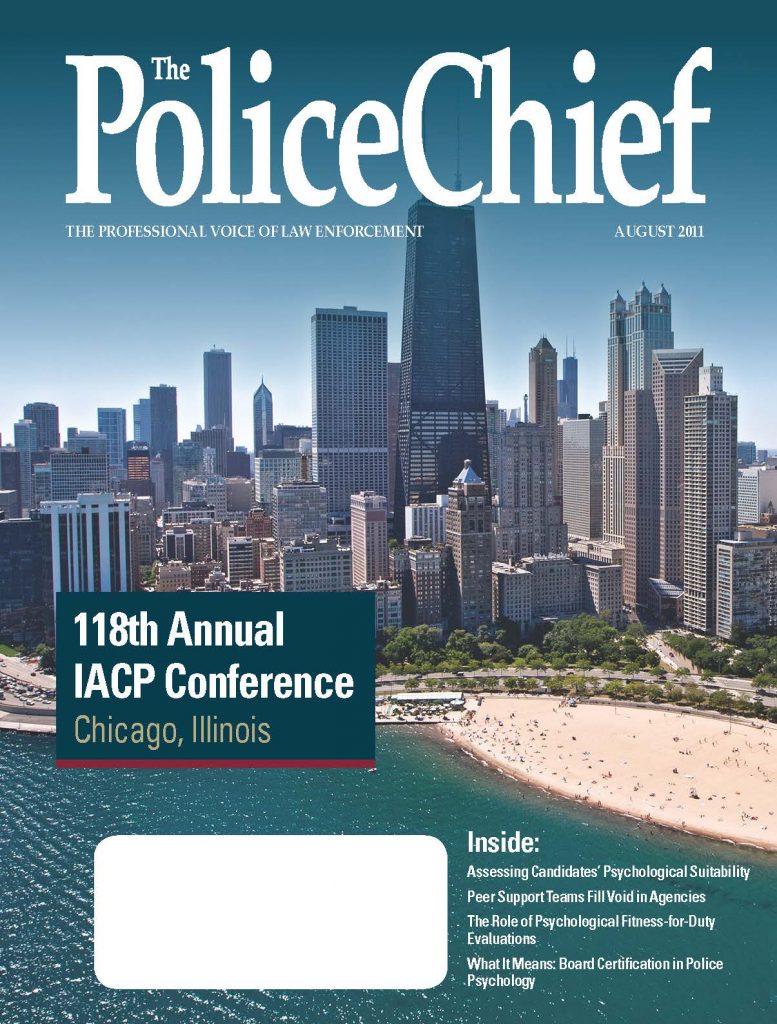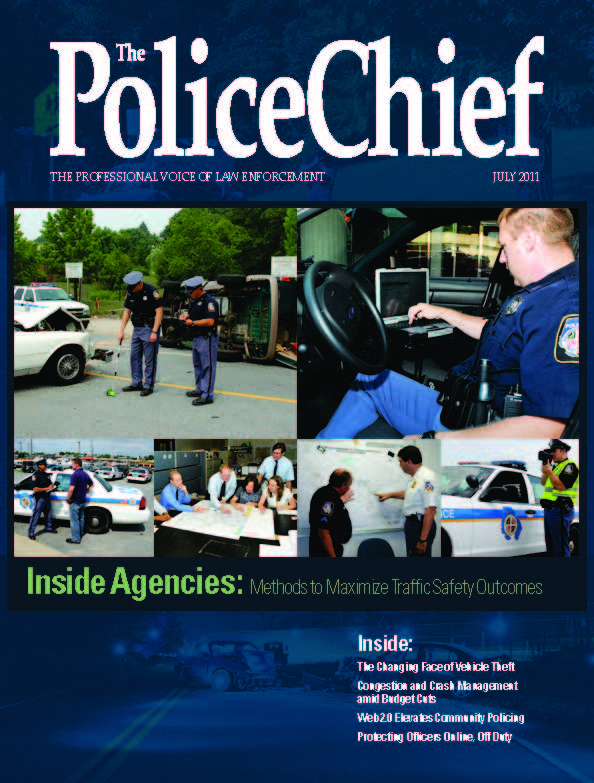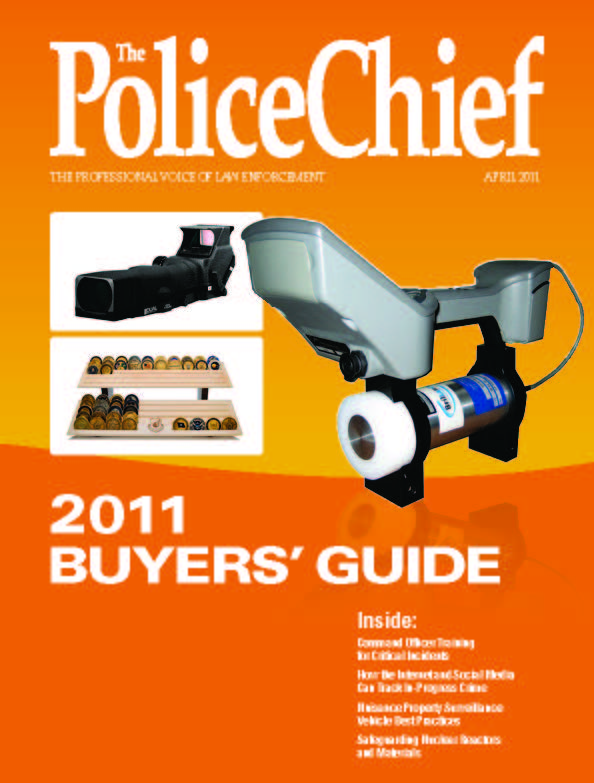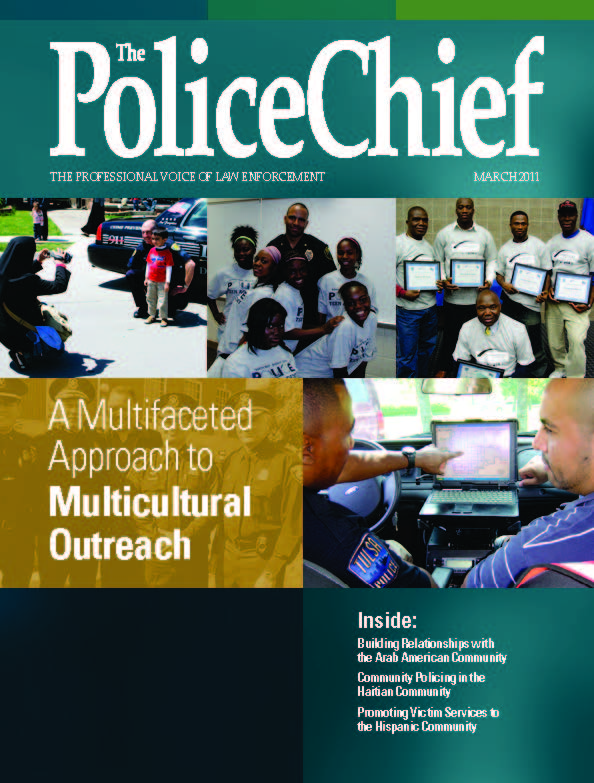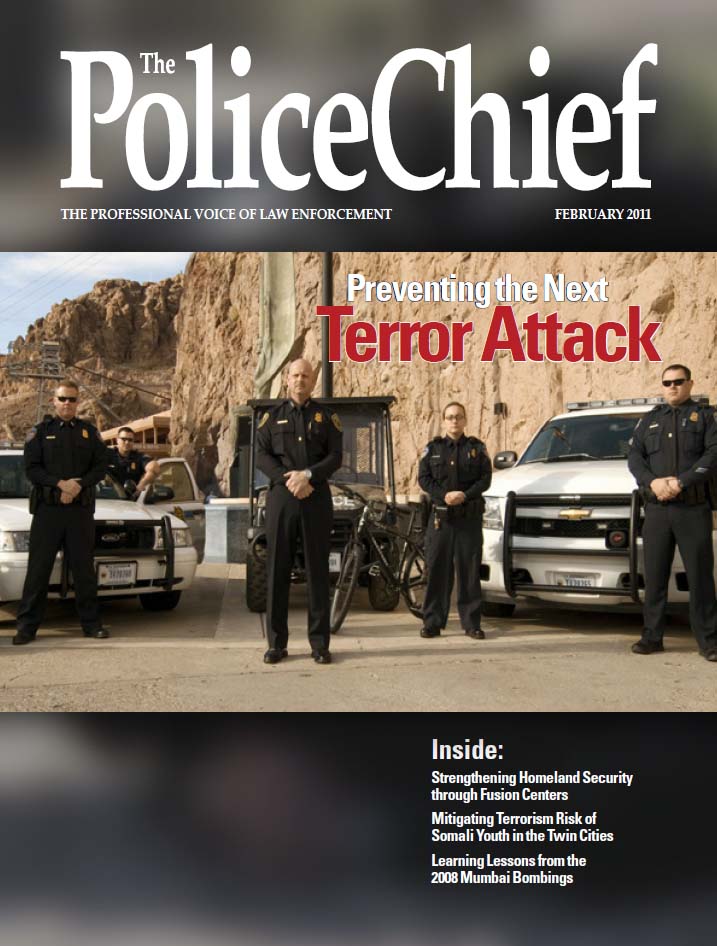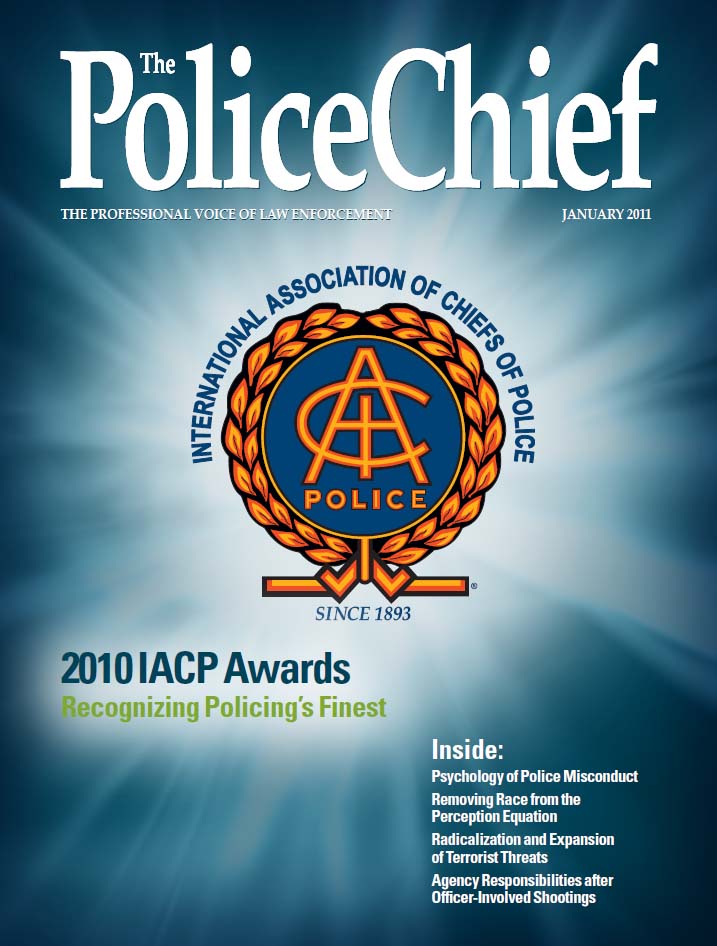Issue Archive
December 2011
Table of Contents
x
- Taking the Straw Man to the Ground: Arguments in Support of the Linear Use-of-Force Continuum
- How Police Can Use Hospital Laws to Speed Processing in Hospital Emergency Departments
- On Choosing the Right Operational Police Physician
- Intelligence-Led Policing: The Future Is Now
- "Just a Volunteer”: Supporting An Agency’s Volunteer Program through Difficult Times
- Providing Effective Policing for Aboriginal Communities
- The IACP and Alcatel-Lucent Present International and Domestic Police Officer of the Year Awards
November 2011
Table of Contents
x
- Police Education and Training: An Intelligence-Led Future
- Establishing a Career Pipeline in Public Schools
- IACP Names New Executive Director, Bart R. Johnson
- Leadership Training for Police Recruits Creating a Foundation for Professional Excellence
- Total Integration of Executive Training and Higher Education: The Georgia Law Enforcement Command College
- NAMI and Law Enforcement Executives: Working Together to Improve Police Responses to People with Mental Illness
- Understanding and Helping Drivers with Alzheimer’s Disease
- Missing Incidents in Persons with Alzheimer's Disease: Current Research and Search Strategies
October 2011
Table of Contents
x
- Dan Rosenblatt Receives COPS Lifetime Achievement Award
- IACP Abroad: 9th IACP South American Executive Policing Conference
- A Multidisciplinary Approach Is the Key to Combating Child Sex Trafficking
- Consolidation, Amalgamation, Regionalization: When Harsh Economic Realities Impact Police Agencies
- Implicit Bias and Law Enforcement
- Policing at the Speed of Trust
- In Memory of Chief James P. Damos, 1919–2011, IACP President, 1981–1982
- Department of Homeland Security Partners with State, Local, Territorial, and Tribal Law Enforcement to Counter Transnational Drug Trafficking
- Multiband Radio Enables Dynamic Communications Interoperability
- Consolidation Caveats
September 2011
Table of Contents
x
- 10 Years after 9/11: Lessons Learned by the New York City Police Department
- Handling Mass Fatalities: Advancements since 9/11 by the Office of the Chief Medical Examiner’s World Trade Center Identification Unit
- Counter Criminal Continuum (C3) Policing in Springfield, Massachusetts: A Collaborative Effort between City and State Police to Reduce Gang Violence
- Mobile Biometric Devices: What the Future Holds
- Shining a Forensic Light on the Warfight
- What Law Enforcement Needs to Know about Improvised Explosives
- The Arizona National Park Service Unit: Applying Advanced Investigative Science to Protecting the Nation’s Natural Treasures
- Challenges of Emerging Technology: Beyond the Technology Itself
- Proposed IACP Constitutional Amendments
August 2011
Table of Contents
x
- In Memory of Chief Joseph S. Dominelli, 1917–2011; IACP President, 1979–1980
- Police Psychologists: Roles and Responsibilities in a Law Enforcement Agency
- Police Psychologists as Consultants
- Assessing the Psychological Suitability of Candidates for Law Enforcement Positions
- The Role of Psychological Fitness-for-Duty Evaluations in Law Enforcement
- Peer Support Teams Fill an Emotional Void in Law Enforcement Agencies
- August 2011 Product Update
- Support and Sustain: Psychological Intervention for Law Enforcement Personnel
- Board Certification in Police Psychology: What It Means to Public Safety
July 2011
Table of Contents
x
- Data-Driven Practices Maximize Resources amid Shrinking Budgets
- Traffic Incident Management: Protecting Officers, Saving Lives, and Ensuring the Surface Transportation System’s Efficiency
- Serious about Seat Belts
- The Changing Face of Vehicle Theft
- Preventing Traffic-Related Line-of-Duty Deaths
- Keeping Our Roadways Safe with Speed-Measuring Devices
- Engaging the Public and Protecting Agencies and Personnel on Facebook and Beyond
- Using Technology to Take Community Policing to the Next Level
- Protecting Officers Online, Off Duty: How Police Chiefs Can Safeguard Officers with Policy Guidance on Social Networking
June 2011
Table of Contents
x
- Recruiting Women, Qualified Officers to the United Nations Police Division
- Supporting the Work of Police Officers in Postconflict Countries
- INTERPOL: Connecting Police for a Safer World
- Policing Aboriginal Critical Incidents
- Bridging the Interoperability Gap through Integrated Partnerships
- How Location-Based Services Can Improve Policing
- Safety and Health Protection Efforts in the Police Service
May 2011
Table of Contents
x
- National Peace Officers Memorial Day
- Research, Policy, and Training Improve Officer Safety
- When Officers Die: Understanding Deadly Domestic Violence Calls for Service
- Officer Safety: A Multidimensional Challenge
- Promoting Officer Safety: A Priority Focus of the U.S. Department of Justice
- The IACP and the Bureau of Justice Assistance Create the National Center for the Prevention of Violence Against the Police
- Stopping IEDs: DHS Tools and Resources for Law Enforcement
- Responder Knowledge Base: An Agency’s First Response
April 2011
Table of Contents
x
- Police Week 2011
- Citizen Monitors, CCTV, and the Internet: A Combination to Consider
- Law Enforcement’s Newest Weapon: Internet Scanning and Use of Social Media for In-Progress Crime
- Closed-Circuit Television: Peoria’s Nuisance Property Surveillance Vehicles
- Biometrics for Intelligence-Led Policing: The Coming Trends
- The Los Angeles Police Department's Hydra Program: Command Officer Training for Critical Incidents
- Safeguarding U.S. Nuclear Reactors and Nuclear Materials
- Updating Ethics Training—Policing Privacy Series: Managing Risk by Reducing Internal Litigation
March 2011
Table of Contents
x
- The Brooklyn Park, Minnesota, Police’s Joint Community-Police Partnership
- Community Policing in the Delray Beach, Florida, Haitian Community
- Fairness and Neutrality: Addressing the Issue of Race in Policing
- Building Trust, Driving Relationships with the Dearborn, Michigan, Arab American Community
- Developing a Multifaceted Approach to Hispanic Outreach
- Promoting Victim Services to the Hispanic Community
- INTERPOL: A Counterterrorism Resource for Police Executives
February 2011
Table of Contents
x
- 112th U.S. Congress Officially Starts
- 700 MHz D-Block Radio Spectrum: It’s Important to IACP Members
- Advances & Applications
- Can Alcohol Ignition Interlocks Save Even More Lives?
- February 2011
- February 2011
- February 2011
- February 2011
- February 2011
- Fusion Centers: Strengthening the Nation’s Homeland Security Enterprise
- IACP Foundation: Motorola Imparts Key Training Concepts for Law Enforcement Leaders
- Improving Criminal Intelligence Sharing: How the Criminal Intelligence Coordinating Council Supports Law Enforcement and Homeland Security
- It Can and Does Happen Here: Somali Youth with Terrorist Ties in the Twin Cities
- Learning from the Lessons of the 2008 Mumbai Terrorist Attacks
- Looking for Heroes
- Nationwide SAR Initiative Delivers Value to Fusion Centers
- Preventing the Next Terror Attack
- Technology’s Impact on Law Enforcement—Community Interaction
- Updating Ethics Training—Policing Privacy Series: Respecting Society’s Evolving Privacy Expectations
- Vehicle Searches in the Wake of Arizona v. Gant
January 2011
Table of Contents
x
- Psychological Factors after Officer-Involved Shootings: Addressing Officer Needs and Agency Responsibilities
- Understanding the Psychology of Police Misconduct
- Updating Ethics Training-Policing Privacy Series: Taking Race out of the Perception Equation
- War on Terror or Policing Terrorism? Radicalization and Expansion of the Threats
- Awards Presented during IACP 2010 in Orlando, Florida


